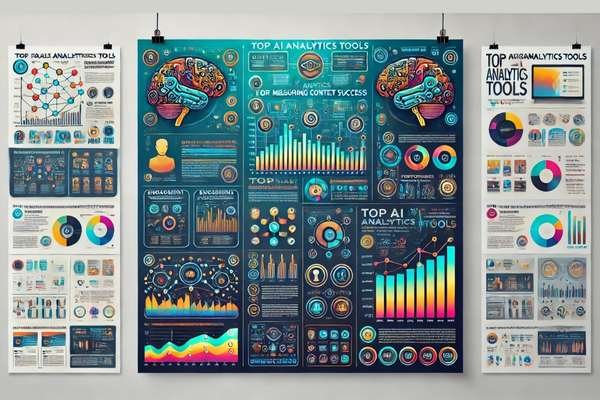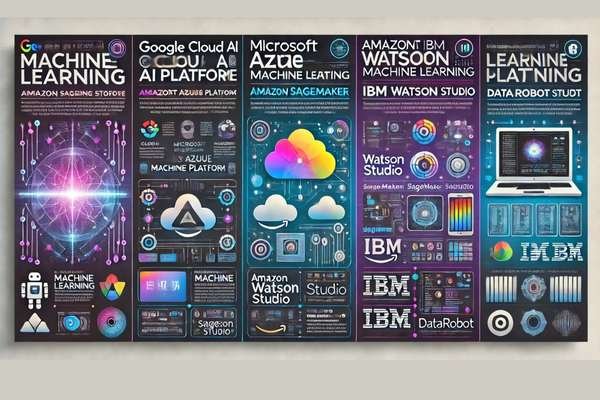
Top AI Tools for Smart Content Recommendations
November 14, 2024
Best Speech-to-Text Tools for Content Automation
November 14, 2024Top AI Analytics Tools for Measuring Content Success: For digital marketers, developers, and content creators, tracking and measuring content performance is essential. Today, AI analytics tools have become powerful allies in understanding what works and what doesn’t. By using AI-powered tools, professionals can gain insights into engagement, reach, conversions, and other key metrics, allowing for data-driven improvements. This article explores the top AI analytics tools for measuring content success and provides guidance on choosing the best tool for your needs.
Table of Contents
1. Why AI Analytics is Essential for Measuring Content Success
In today’s digital landscape, merely creating content isn’t enough; understanding how it performs is what drives impactful strategies. AI analytics tools help marketers analyze large volumes of data, revealing trends, user behaviors, and engagement metrics that are critical to optimizing content.
Benefits of Using AI Analytics for Content Measurement
- Real-time Insights: AI tools provide up-to-the-minute data, allowing for quick adjustments.
- Predictive Analytics: Forecast trends and audience behavior to shape future content.
- User-Centric Metrics: Understand what resonates with your audience for personalized strategies.
2. Top AI Analytics Tools for Measuring Content Success
1: Google Analytics (Enhanced by AI)
Google Analytics is a cornerstone for content analytics, now enhanced by Google’s AI-driven insights. It offers detailed data on visitor behavior, traffic sources, and conversions, and its AI capabilities enable predictive insights and smarter analysis.
Key Features:
- Audience Insights: AI analyzes user demographics, interests, and behavior.
- Traffic Analysis: Detailed reporting on where your audience comes from and how they navigate your site.
- AI-Powered Alerts: Automated insights notify users of significant changes in traffic and engagement.
How to Leverage Google Analytics for Content Success
- Track Key Metrics: Focus on sessions, bounce rates, and conversions.
- Set Up Goals: Define conversion points to measure success.
- Utilize AI Insights: Use automated alerts to monitor sudden changes in traffic.
Pros and Cons of Google Analytics
- Pros: Extensive data, real-time tracking, powerful integrations.
- Cons: Complex interface, requires setup for advanced tracking.
2: HubSpot Analytics
HubSpot is a comprehensive marketing platform that includes a suite of AI-powered analytics tools. From tracking customer journeys to measuring content engagement, HubSpot is ideal for those looking to understand how content impacts the sales funnel.
Key Features:
- Funnel Analysis: Tracks how content leads to conversions.
- Behavioral Analytics: Understand what actions visitors take on your site.
- Custom Reporting: AI-powered reports for content performance.
Using HubSpot for Content Analysis
- Map the Customer Journey: Follow visitors from initial interaction to conversion.
- Create Custom Dashboards: Track specific content goals and metrics.
- Measure Engagement: Identify which content drives the most user interactions.
Pros and Cons of HubSpot
- Pros: Holistic view of content performance, easy-to-read dashboards, CRM integration.
- Cons: Can be pricey for small businesses.
3. AI-Powered Tools for Social Media Analytics
3: Hootsuite Analytics
Hootsuite is a leading social media management tool that also offers robust AI-powered analytics. For content creators focusing on social media, Hootsuite tracks engagement, reach, and audience demographics across various platforms.
Key Features:
- Cross-Platform Reporting: View analytics for multiple social networks in one place.
- Audience Insights: Understand who engages with your content.
- Performance Comparison: Benchmark your posts against competitors.
How to Use Hootsuite for Social Media Success
- Analyze Post Performance: Review metrics like engagement, shares, and comments.
- Compare Campaigns: Use analytics to determine which campaigns perform best.
- Audience Targeting: Adjust strategy based on demographic insights.
Pros and Cons of Hootsuite
- Pros: Cross-platform support, easy integration, scheduling capabilities.
- Cons: Limited insights for free accounts.
4: Sprout Social
Sprout Social is another powerful tool for social media analytics, providing detailed reports on content performance, audience insights, and engagement. Its AI capabilities give you the ability to track social listening trends and predict engagement.
Key Features:
- Engagement Tracking: Measures engagement metrics across social platforms.
- Sentiment Analysis: AI detects user sentiment to gauge public perception.
- Trend Analysis: Identifies emerging trends in user behavior.
Maximizing Sprout Social for Social Media Strategy
- Monitor Brand Sentiment: Use AI to track how users feel about your content.
- Identify Trends: Spot trending topics to inform future content.
- Optimize Posting Times: Schedule posts based on engagement predictions.
Pros and Cons of Sprout Social
- Pros: User-friendly interface, detailed engagement metrics, sentiment analysis.
- Cons: Higher cost, especially for smaller teams.
4. AI Tools for Predictive Analytics and Content Recommendations
5: IBM Watson Analytics
IBM Watson Analytics is a sophisticated AI tool known for predictive analysis and content recommendations. It’s ideal for marketers looking to use data to make informed decisions about content strategy.
Key Features:
- Predictive Analytics: Analyzes historical data to forecast trends.
- Natural Language Processing: Provides insights using plain language.
- Data Visualization: Visualizes complex data for easier understanding.
Using IBM Watson for Content Success
- Analyze Historical Data: Use past performance to predict future engagement.
- Get AI-Generated Insights: IBM Watson provides plain-language insights to guide decisions.
- Adjust Strategy: Use recommendations to refine your content strategy.
Pros and Cons of IBM Watson Analytics
- Pros: Advanced predictive capabilities, data visualization, easy-to-interpret insights.
- Cons: Expensive, may require technical expertise.
Top AI Analytics Tools for Measuring Content Success recap
| Tool | Key Features | Best Use Case | Official Website |
|---|---|---|---|
| Google Analytics (Enhanced by AI) |
| Tracking visitor behavior and optimizing website performance | Visit Google Analytics |
| HubSpot Analytics |
| Understanding the customer journey and driving conversions | Visit HubSpot |
| Hootsuite Analytics |
| Social media analytics and campaign comparisons | Visit Hootsuite |
| Sprout Social |
| Analyzing social sentiment and optimizing social strategies | Visit Sprout Social |
| IBM Watson Analytics |
| Forecasting trends and refining content strategy | Visit IBM Watson |
Frequently Asked Questions
What are the main benefits of using AI analytics tools for content measurement?
AI analytics tools help automate data analysis, providing real-time insights and predictive analytics. This allows marketers to optimize content strategies based on performance and audience engagement.
Which AI analytics tools are best for social media content measurement?
Hootsuite Analytics and Sprout Social are top AI tools for tracking social media metrics, engagement, and sentiment analysis. They offer cross-platform support and provide valuable audience insights.
How does AI in analytics improve content recommendations?
AI analytics tools like IBM Watson analyze historical data to predict trends and offer personalized content recommendations, enabling marketers to tailor content for better engagement and conversion rates.
Conclusion
AI analytics tools have transformed how marketers measure content success, providing essential insights into user engagement, traffic sources, and conversion rates. From Google Analytics and HubSpot to Hootsuite and IBM Watson, these tools empower digital marketing professionals, developers, and content creators to make data-driven decisions, ultimately leading to higher content effectiveness and ROI. Embracing AI analytics is now a necessity for those looking to thrive in today’s competitive digital landscape.








